16 feb 2016

The UN Secretary General’s Special Coordinator for the Middle East Peace Process Nickolay Mladenov arrived in Gaza on Tuesday afternoon via the Beit Hanun (Erez) crossing.
The local news agency SAFA quoted what it called “special sources” as saying that Mladenov inspected progress in the reconstruction projects in Shujaiya suburb, east of Gaza City.
The agency said that the UN envoy would address a press conference at noon Wednesday that would tackle the issue of reconstructing houses, buildings, and facilities destroyed by the Israeli aggression on the coastal enclave in summer 2014.
The local news agency SAFA quoted what it called “special sources” as saying that Mladenov inspected progress in the reconstruction projects in Shujaiya suburb, east of Gaza City.
The agency said that the UN envoy would address a press conference at noon Wednesday that would tackle the issue of reconstructing houses, buildings, and facilities destroyed by the Israeli aggression on the coastal enclave in summer 2014.
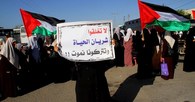
A human rights report released Monday denied Israeli claims on easing restrictions on the blockaded Gaza Strip.
A report by the Palestinian Human Rights Center on the situation of Gaza’s border-crossings in January 2016 warned of Israel’s attempts to institutionalize the siege imposed on Gaza for the 10th year running, in a flagrant violation of international and humanitarian laws.
The report kept record of ongoing restrictions on the import of basic products and goods, along with reconstruction materials.
The center also pointed out Israel’s closure of the Karem Abu Salem commercial crossing for 10 days (amounting to 32.2% of the month).
Restrictions on Gaza’s exports to the occupied West Bank and 1948 Occupied Palestine were also documented by the study. Gaza’s exports during the month of January have been estimated at 6% only of the overall export rate before June 2007, when the siege was not yet imposed.
The report documented the difficulties in Palestinians’ access out of and into blockaded Gaza via the Beit Hanun border crossing. Such Israeli restrictions blocked the movement of two million Gazans.
The center called on the international community and the parties involved in the 1949 Fourth Geneva Convention to immediately step in and urge the Israeli occupation to lift the siege and open the border crossings before Gaza’s stranded passengers and humanitarian cases.
A report by the Palestinian Human Rights Center on the situation of Gaza’s border-crossings in January 2016 warned of Israel’s attempts to institutionalize the siege imposed on Gaza for the 10th year running, in a flagrant violation of international and humanitarian laws.
The report kept record of ongoing restrictions on the import of basic products and goods, along with reconstruction materials.
The center also pointed out Israel’s closure of the Karem Abu Salem commercial crossing for 10 days (amounting to 32.2% of the month).
Restrictions on Gaza’s exports to the occupied West Bank and 1948 Occupied Palestine were also documented by the study. Gaza’s exports during the month of January have been estimated at 6% only of the overall export rate before June 2007, when the siege was not yet imposed.
The report documented the difficulties in Palestinians’ access out of and into blockaded Gaza via the Beit Hanun border crossing. Such Israeli restrictions blocked the movement of two million Gazans.
The center called on the international community and the parties involved in the 1949 Fourth Geneva Convention to immediately step in and urge the Israeli occupation to lift the siege and open the border crossings before Gaza’s stranded passengers and humanitarian cases.

The Israeli occupation authorities (IOA) on Monday ordered ten Palestinian civilians to stop the underway construction of their family homes in northern Arab al’Ramadein community and Qalqilya city, in the northern occupied West Bank.
Anti-settlement activist in Qalqilya Muhammad Abu Sheikh said the IOA ordered three Palestinians in Arab al-Ramadein to stop the construction of their homes.
Similar orders by the IOA were also slapped on seven Palestinians in eastern Qalqilya city.
Anti-settlement activist in Qalqilya Muhammad Abu Sheikh said the IOA ordered three Palestinians in Arab al-Ramadein to stop the construction of their homes.
Similar orders by the IOA were also slapped on seven Palestinians in eastern Qalqilya city.
15 feb 2016
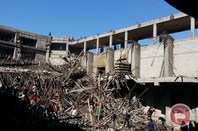
At least 21 people were injured on Monday after a ceiling collapsed in a building under construction on a university campus in the southern Gaza Strip, a Gaza civil defense service spokesman said.
Muhammad al-Midana said the ceiling collapsed during construction work.
Sources in the Gaza civil defense rescue service told Ma’an that both students of al-Aqsa University’s Khan Yunis branch and workers were among the wounded. At least 12 of the injured were taken to Nasser medical center in Khan Yunis while rescue teams were evacuating the others.
The Gaza Strip has been under a crippling Israeli blockade since 2007, which has severely impaired the construction sector in the Palestinian enclave as building materials are hard to come by.
The World Bank on Thursday highlighted the “extremely difficult” situation in the Gaza Strip, which it said has only received six percent of the funding it needs to recover from the latest devastating Israeli offensive on the besieged territory in 2014.
Muhammad al-Midana said the ceiling collapsed during construction work.
Sources in the Gaza civil defense rescue service told Ma’an that both students of al-Aqsa University’s Khan Yunis branch and workers were among the wounded. At least 12 of the injured were taken to Nasser medical center in Khan Yunis while rescue teams were evacuating the others.
The Gaza Strip has been under a crippling Israeli blockade since 2007, which has severely impaired the construction sector in the Palestinian enclave as building materials are hard to come by.
The World Bank on Thursday highlighted the “extremely difficult” situation in the Gaza Strip, which it said has only received six percent of the funding it needs to recover from the latest devastating Israeli offensive on the besieged territory in 2014.
11 feb 2016
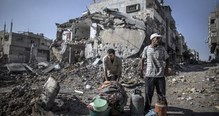
Italy declared on Wednesday it would donate 1 million Euros to raise funds for the Gaza reconstruction, after the 51-day Israeli offensive in summer 2014 destroyed most of its infrastructure.
Following his meeting with members of the Italian Cooperation and Development organization, Minister of public works and housing Mufeed al-Hasayna said that the reconstruction of totally and partially damaged houses is to kick off soon after the Italian donation.
During a press conference, al-Hasayna said that 1.2 million Euros will be allocated for rebuilding partially damaged houses while 80,000 Euros will be allocated for the reconstruction of a totally damaged neighborhood north of the Strip.
International donors have pledged $5.4 bn (£3.4 bn) for the reconstruction of Gaza at a conference in Cairo following Israel’s summer aggression on the strip. At least 100,000 Gazans lost their homes in the 51-day offensive in July-August 2014. Much of the territory's infrastructure was also damaged.
Following his meeting with members of the Italian Cooperation and Development organization, Minister of public works and housing Mufeed al-Hasayna said that the reconstruction of totally and partially damaged houses is to kick off soon after the Italian donation.
During a press conference, al-Hasayna said that 1.2 million Euros will be allocated for rebuilding partially damaged houses while 80,000 Euros will be allocated for the reconstruction of a totally damaged neighborhood north of the Strip.
International donors have pledged $5.4 bn (£3.4 bn) for the reconstruction of Gaza at a conference in Cairo following Israel’s summer aggression on the strip. At least 100,000 Gazans lost their homes in the 51-day offensive in July-August 2014. Much of the territory's infrastructure was also damaged.
8 feb 2016
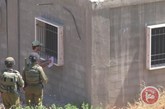
Israeli forces ordered on Monday the demolition of corrugated metal homes in Beita village, southeast of Nablus city in the northern occupied West Bank, a local monitor said.
Ghassan Daghlas, who monitors settlement activities in the northern West Bank, told Ma’an that Israeli troops said the homes would be demolished because they were built without proper building permits.
While demolitions in the occupied West Bank decreased by 10 percent in 2015 from the previous year, the UN Office for the Coordination of Humanitarian Affairs (OCHA) reported that 539 Palestinian-owned structures were still demolished, leaving many Palestinians homeless.
The majority were demolished in Area C, which is under full Israeli control, on the grounds of lacking building permits.
In order for Palestinians to build in Area C, land owners must obtain building permits from Israeli authorities. In a report released last year, OCHA found that between 2010 and 2014, only 1.5 percent of 2,020 building permit requests submitted were approved.
Ghassan Daghlas, who monitors settlement activities in the northern West Bank, told Ma’an that Israeli troops said the homes would be demolished because they were built without proper building permits.
While demolitions in the occupied West Bank decreased by 10 percent in 2015 from the previous year, the UN Office for the Coordination of Humanitarian Affairs (OCHA) reported that 539 Palestinian-owned structures were still demolished, leaving many Palestinians homeless.
The majority were demolished in Area C, which is under full Israeli control, on the grounds of lacking building permits.
In order for Palestinians to build in Area C, land owners must obtain building permits from Israeli authorities. In a report released last year, OCHA found that between 2010 and 2014, only 1.5 percent of 2,020 building permit requests submitted were approved.
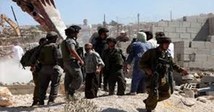
Israeli Occupation Forces Sunday morning handed a stop-construction notice to a Palestinian family notifying them to stop building their home in Yetma town to the south of Nablus city.
Khalil al-Najjar, member of the family, told the PIC reporter that a force of Israeli army escorted by a car of the Israeli civil administration came to their home and handed a stop-of-construction notice to the family for the claim of lacking a building permit.
The forces warned his family of demolishing their home unless he goes to the civil administration office in Beit El on February, 24, Najjar said.
Najjar also explained that the house consists of a basement floor with an area estimated at 70 square meters. It houses five persons and was constructed three years ago, he pointed out.
Khalil al-Najjar, member of the family, told the PIC reporter that a force of Israeli army escorted by a car of the Israeli civil administration came to their home and handed a stop-of-construction notice to the family for the claim of lacking a building permit.
The forces warned his family of demolishing their home unless he goes to the civil administration office in Beit El on February, 24, Najjar said.
Najjar also explained that the house consists of a basement floor with an area estimated at 70 square meters. It houses five persons and was constructed three years ago, he pointed out.
5 feb 2016
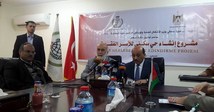
Palestinian minister of works Mufid al-Hasayneh on Thursday signed an agreement with the Turkish relief group IHH to build a residential neighborhood for the impoverished families in the Gaza Strip.
The agreement was signed during a ceremony held at the headquarters of the ministry of works in Gaza. Minister Hasayneh hailed the generous support provided by Turkey and its people for the Palestinian people and their national cause.
The minister stated in press remarks that the neighborhood would be built in Johr Addik area, south of Gaza City, affirming that his ministry would start to carry out the project immediately.
The neighborhood will include 132 housing units and will be earmarked for the housing of the poorest families in Gaza, according to the minister. For his part, head of IHH Mohamed Kaya stated that his foundation would continue its support for the Palestinians and their steadfastness until the liberation of their whole land.
Kaya pointed out that the number of the housing units are not enough to accommodate all poor families in Gaza and pledged to work hard to build more units later.
The agreement was signed during a ceremony held at the headquarters of the ministry of works in Gaza. Minister Hasayneh hailed the generous support provided by Turkey and its people for the Palestinian people and their national cause.
The minister stated in press remarks that the neighborhood would be built in Johr Addik area, south of Gaza City, affirming that his ministry would start to carry out the project immediately.
The neighborhood will include 132 housing units and will be earmarked for the housing of the poorest families in Gaza, according to the minister. For his part, head of IHH Mohamed Kaya stated that his foundation would continue its support for the Palestinians and their steadfastness until the liberation of their whole land.
Kaya pointed out that the number of the housing units are not enough to accommodate all poor families in Gaza and pledged to work hard to build more units later.
1 feb 2016
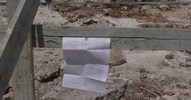
The Israeli occupation army on Sunday evening ordered a Palestinian to stop building his new house in Beit Ummar town, north of al-Khalil city.
Anti-settlement activist Mohamed Awad said that Israeli soldiers stormed Wadi al-Sheikh area near al-Khalil-Jerusalem road and put up a notice ordering Osama al-Alami to stop construction works in the house.
Awad added that the soldiers confiscated construction materials and equipment from the site.
Anti-settlement activist Mohamed Awad said that Israeli soldiers stormed Wadi al-Sheikh area near al-Khalil-Jerusalem road and put up a notice ordering Osama al-Alami to stop construction works in the house.
Awad added that the soldiers confiscated construction materials and equipment from the site.
30 jan 2016

Israeli Occupation Forces (IOF) Friday night confiscated heavy equipment used for paving a road in northern Jordan Valley for the prohibition of work on that road.
Local sources told the PIC reporter that Israeli forces confiscated three bulldozers and three trucks while working on opening an agricultural land in al-Deir border area to the east of Ain al-Beida village in northern Jordan Valley.
Israeli troops took the workers along with the vehicles to a nearby military camp and warned them of carrying on work on that road, the sources pointed out.
Local sources told the PIC reporter that Israeli forces confiscated three bulldozers and three trucks while working on opening an agricultural land in al-Deir border area to the east of Ain al-Beida village in northern Jordan Valley.
Israeli troops took the workers along with the vehicles to a nearby military camp and warned them of carrying on work on that road, the sources pointed out.
27 jan 2016
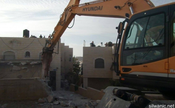
The Wadi Hilweh Information Center in Silwan (Silwanic) has reported that Israeli soldiers have demolished, on Tuesday morning, an under construction Palestinian home, in Jabal al-Mokabber town, in occupied Jerusalem.
Silwanic said the demolished property belongs to a Palestinian, identified as Ibrahim Ali Mousa Sorri, in the Sal’a neighborhood.
Sorri said he was conducting the final works on the new property, and was getting ready to move in, with his wife and their six children, in the coming few weeks.
He added that, nearly six months ago, the army and employees of the City Council handed him an order to stop the construction, and since then, he has been trying to get all needed documents, and file appeals, but the city went ahead and demolished the property.
The new building was 60 square/meter, with an estimate construction cost of 130.000 Shekels, in addition to 80.000 for its wall and garden.
Silwanic said the demolished property belongs to a Palestinian, identified as Ibrahim Ali Mousa Sorri, in the Sal’a neighborhood.
Sorri said he was conducting the final works on the new property, and was getting ready to move in, with his wife and their six children, in the coming few weeks.
He added that, nearly six months ago, the army and employees of the City Council handed him an order to stop the construction, and since then, he has been trying to get all needed documents, and file appeals, but the city went ahead and demolished the property.
The new building was 60 square/meter, with an estimate construction cost of 130.000 Shekels, in addition to 80.000 for its wall and garden.
26 jan 2016
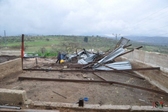
In the early morning, 18th January, hundreds of Israeli soldiers entered the Jin Safoot village to demolish a farmhouse belonging to the Palestinian farmer Faed.
The barn was serving as a shelter for his animals and he wasn’t allowed to remove all of them before the Israelis demolished the roof. Faed claims that two of his sheeps died after being smashed underneath the falling roof.
Israeli soldiers shot two of the family members while they were trying to stop the ongoing demolition.
One of them was hit by a live bullet in his left hand and the family now fears that he won’t regain full strength in one of his fingers. Another family member was peppersprayed and arrested on the scene. He is now being imprisoned in a Israeli military base in Huwarra, West Bank.
Faed's farm is located in Area C. Roughly 60% of the West Bank is under complete Israeli control since the Oslo accords in 1990’s. To be allowed to build a house in Area C you have to get a permission from the Israeli authorities. These requests are often denied and at the same time farmers are likely to face demolition if they construct a building without Israeli permission.
According to the Israeli NGO Peace Now, Israeli Civil Administration denied 94% of the applications between 2000 and 2007.
In 2007 Israeli soldiers demolished another building belonging to Faed, also located in Area C. For the six previous years Faed has worked hard to build a new home for him and his family and the destruction came as a shock. The recent destruction of his farm house is yet another backlash for him, mentally as well as financially. To be able to rebuild his barn he now has to sell parts of his land. If he rebuilds it, it would still be under constant threat of demoliotion.
The barn was serving as a shelter for his animals and he wasn’t allowed to remove all of them before the Israelis demolished the roof. Faed claims that two of his sheeps died after being smashed underneath the falling roof.
Israeli soldiers shot two of the family members while they were trying to stop the ongoing demolition.
One of them was hit by a live bullet in his left hand and the family now fears that he won’t regain full strength in one of his fingers. Another family member was peppersprayed and arrested on the scene. He is now being imprisoned in a Israeli military base in Huwarra, West Bank.
Faed's farm is located in Area C. Roughly 60% of the West Bank is under complete Israeli control since the Oslo accords in 1990’s. To be allowed to build a house in Area C you have to get a permission from the Israeli authorities. These requests are often denied and at the same time farmers are likely to face demolition if they construct a building without Israeli permission.
According to the Israeli NGO Peace Now, Israeli Civil Administration denied 94% of the applications between 2000 and 2007.
In 2007 Israeli soldiers demolished another building belonging to Faed, also located in Area C. For the six previous years Faed has worked hard to build a new home for him and his family and the destruction came as a shock. The recent destruction of his farm house is yet another backlash for him, mentally as well as financially. To be able to rebuild his barn he now has to sell parts of his land. If he rebuilds it, it would still be under constant threat of demoliotion.
18 jan 2016

The Israeli occupation authorities (IOA) on Sunday gave orders for immediately halting the digging of a water well in the southern occupied West Bank province of al-Khalil and seized a set of digging equipment.
Coordinator for the popular anti-settlement committee in Yatta town, Rateb al-Jabour, said the occupation troops rolled into al-Mafkara area, near the illegal Israeli settlement of Avijal, near Yatta, and obstructed the construction of a water well belonging to the Hamamda family before they ceased digging tools owned by contractor Muhammad al-Hamamda.
Al-Jabour added that the Israeli occupation army and settlers have often resorted to such policies to mar Palestinians’ lives in Yatta town and force them out of their own and only lands in favor of illegal settlement expansion.
Coordinator for the popular anti-settlement committee in Yatta town, Rateb al-Jabour, said the occupation troops rolled into al-Mafkara area, near the illegal Israeli settlement of Avijal, near Yatta, and obstructed the construction of a water well belonging to the Hamamda family before they ceased digging tools owned by contractor Muhammad al-Hamamda.
Al-Jabour added that the Israeli occupation army and settlers have often resorted to such policies to mar Palestinians’ lives in Yatta town and force them out of their own and only lands in favor of illegal settlement expansion.
17 jan 2016
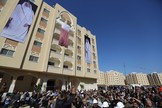
The Qatari committee for Gaza reconstruction and the ministry of works in Gaza distributed the Phase-one apartments of Sheikh Hamad City in Khan Younis in the southern Gaza Strip.
Gazans in Khan Younis celebrated this achievement on Saturday in the presence of the Palestinian former Prime Minister Ismail Haneyya, the Qatari Ambassador Mohammad al-Emadi, and the minister of works Mufid al-Hasayna.
Hasayna said that 1,060 housing units will be granted to its owners while the Strip still needs 130,000 more housing units.
The Qatari Ambassador Emadi affirmed that 25% of the second phase has been accomplished, saying that Qatar continues working on key projects for the reconstruction of Gaza.
Ismail Haneyya, deputy head of Hamas’s political bureau, hailed the role of Qatar in exertig unremitting efforts in support of the Gaza Strip.
Haneyya said that during his latest visit to Qatar, he put the foundation stone for the endowment of Jerusalem which is a 33-story charity building, the proceeds of which would be allocated for the steadfastness of the people of Jerusalem. The first project of the endowment would be establishing an ideal school with a value estimated at one million dollars.
Gazans in Khan Younis celebrated this achievement on Saturday in the presence of the Palestinian former Prime Minister Ismail Haneyya, the Qatari Ambassador Mohammad al-Emadi, and the minister of works Mufid al-Hasayna.
Hasayna said that 1,060 housing units will be granted to its owners while the Strip still needs 130,000 more housing units.
The Qatari Ambassador Emadi affirmed that 25% of the second phase has been accomplished, saying that Qatar continues working on key projects for the reconstruction of Gaza.
Ismail Haneyya, deputy head of Hamas’s political bureau, hailed the role of Qatar in exertig unremitting efforts in support of the Gaza Strip.
Haneyya said that during his latest visit to Qatar, he put the foundation stone for the endowment of Jerusalem which is a 33-story charity building, the proceeds of which would be allocated for the steadfastness of the people of Jerusalem. The first project of the endowment would be establishing an ideal school with a value estimated at one million dollars.
15 jan 2016
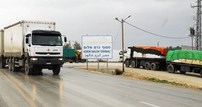
The Israeli occupation authority (IOA) has decided to put more restrictions on the travel of Gaza-bound cargo trucks on the roads used by Jewish settlers during rush hour.
According to Yedioth Ahronoth newspaper on Thursday, Israeli minister of transportation Yisrael Katz has issued a verdict preventing all trucks carrying shipments for Gaza from using all roads to Karam Abu Salem crossing.
The Israeli minister claimed the measure was aimed at protecting the safety of Israelis who use the roads heavily during certain times.
Consequently, hundreds of trucks loaded with building materials as well as food and fuel shipments would find a hard time to reach Gaza.
According to the Israeli decision, only Gaza-bound trucks will not be able to travel to Karam Abu Salem from seven to nine o'clock in the morning and from three to five in the afternoon.
However, the decision excluded all cargo trucks which carry goods for areas other than Gaza as well as the Israeli heavy military vehicles traveling on the same roads.
According to Yedioth Ahronoth newspaper on Thursday, Israeli minister of transportation Yisrael Katz has issued a verdict preventing all trucks carrying shipments for Gaza from using all roads to Karam Abu Salem crossing.
The Israeli minister claimed the measure was aimed at protecting the safety of Israelis who use the roads heavily during certain times.
Consequently, hundreds of trucks loaded with building materials as well as food and fuel shipments would find a hard time to reach Gaza.
According to the Israeli decision, only Gaza-bound trucks will not be able to travel to Karam Abu Salem from seven to nine o'clock in the morning and from three to five in the afternoon.
However, the decision excluded all cargo trucks which carry goods for areas other than Gaza as well as the Israeli heavy military vehicles traveling on the same roads.
12 jan 2016

The United Nations Relief and Works Agency for Palestine Refugees in the Near East (UNRWA) said that it received only 20 percent of the money needed for the reconstruction of the destroyed houses in the Gaza Strip, QudsNet reported yesterday.
UNRWA spokesman Adnan Abu Hasna said, according to Al Ray, that the organization received funds for only 2,000 housing units, and that it started building 300 units for the people whose houses were completely destroyed in the 2014 Israeli offensive on Gaza.
Abu Hasna noted that about 80 percent of the first stage of those units is almost ready, calling for the potential beneficiaries from following stages to prepare their building licenses and be ready to receive reconstruction funds.
He added that UNRWA has been exerting efforts to secure the donations pledged during the donor conference held in Cairo, following the Israeli offensive, noting that the organisation received only $250 million of the $724 million pledged.
UNRWA spokesman Adnan Abu Hasna said, according to Al Ray, that the organization received funds for only 2,000 housing units, and that it started building 300 units for the people whose houses were completely destroyed in the 2014 Israeli offensive on Gaza.
Abu Hasna noted that about 80 percent of the first stage of those units is almost ready, calling for the potential beneficiaries from following stages to prepare their building licenses and be ready to receive reconstruction funds.
He added that UNRWA has been exerting efforts to secure the donations pledged during the donor conference held in Cairo, following the Israeli offensive, noting that the organisation received only $250 million of the $724 million pledged.
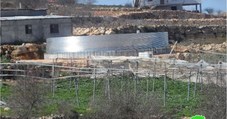
The Israeli occupation authorities (IOA) ordered Palestinian citizens to stop the construction of four agricultural structures in al-Khalil’s northern town of Beit Ummar on account of unlicensed construction.
The Land Research Center at the Arab Studies Society quoted the targeted farmers as stating that Israeli civil administration crews stormed Wadi al-Arab area, to the northeast of Beit Ummar, and attached the notifications to the targeted ponds.
The IOA ordered the farmers to immediately cease construction works, claiming a hearing will be held on January 21, 2016 to decide on the projected demolition of the structures.
According to the Land Research Center, the notified ponds have been built by the Union of Agricultural Work Committees and the Palestinian Hydrology Group as part of intents to support Palestinian farmers in Beit Ummar’s eastern corners.
The targeted structures, intended to irrigate at least 40 dunums of cultivated land lots, are reportedly owned by the four Palestinian citizens Waheed Abu Maria, Ghassen Ibregheith, Jameel Abu Maria, and Khaled Ibregheith.
The Land Research Center at the Arab Studies Society quoted the targeted farmers as stating that Israeli civil administration crews stormed Wadi al-Arab area, to the northeast of Beit Ummar, and attached the notifications to the targeted ponds.
The IOA ordered the farmers to immediately cease construction works, claiming a hearing will be held on January 21, 2016 to decide on the projected demolition of the structures.
According to the Land Research Center, the notified ponds have been built by the Union of Agricultural Work Committees and the Palestinian Hydrology Group as part of intents to support Palestinian farmers in Beit Ummar’s eastern corners.
The targeted structures, intended to irrigate at least 40 dunums of cultivated land lots, are reportedly owned by the four Palestinian citizens Waheed Abu Maria, Ghassen Ibregheith, Jameel Abu Maria, and Khaled Ibregheith.
11 jan 2016
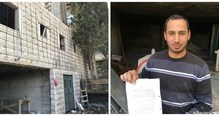
The Israeli Municipality in occupied Jerusalem has issued a demolition order against a Palestinian building in Silwan town.
The Israeli police forces stormed in large numbers al-Thawari neighborhood in Silwan town on Sunday and delivered a demolition order to Mousa al-Abbasi against his building for being built without permit, Wadi al-Hilweh Information Center reported.
The two-story building was built four years ago on a 230-square-meter land that had been purchased from its owner nearly eight years ago, al-Abbasi clarified.
"I have been trying to get a building permit over the past years but it was in vain", he continued.
The Israeli daily Haaretz earlier said that only seven percent of the building permits issued in occupied Jerusalem over the past few years have gone to the Palestinian neighborhoods.
The Israeli police forces stormed in large numbers al-Thawari neighborhood in Silwan town on Sunday and delivered a demolition order to Mousa al-Abbasi against his building for being built without permit, Wadi al-Hilweh Information Center reported.
The two-story building was built four years ago on a 230-square-meter land that had been purchased from its owner nearly eight years ago, al-Abbasi clarified.
"I have been trying to get a building permit over the past years but it was in vain", he continued.
The Israeli daily Haaretz earlier said that only seven percent of the building permits issued in occupied Jerusalem over the past few years have gone to the Palestinian neighborhoods.
7 jan 2016
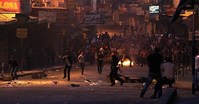
Violent clashes broke out Thursday evening in Beit Awa town in al-Khalil when Israeli Occupation Forces (IOF) stormed in large numbers the town near the Apartheid Wall.
According to local sources, the clashes erupted after IOF stormed Beit Awa town amid heavy fire of tear gas bombs, causing several suffocation cases among the residents.
Daily clashes have been reported in the town between local youths and Israeli forces.
Meanwhile, Israeli forces notified two Palestinian citizens to stop construction work in their two houses in Beit Ummar, town north of al-Khalil.
Speaking to the PIC reporter, the local activist Mohamed Awad affirmed that IOF stormed two houses belonging to two brothers, east of the town, and handed both of them a notification to stop construction work in their houses under the pretext of being built without permit.
Israeli forces also confiscated building materials and equipment used in the construction work estimated at 10,000 shekels.
According to local sources, the clashes erupted after IOF stormed Beit Awa town amid heavy fire of tear gas bombs, causing several suffocation cases among the residents.
Daily clashes have been reported in the town between local youths and Israeli forces.
Meanwhile, Israeli forces notified two Palestinian citizens to stop construction work in their two houses in Beit Ummar, town north of al-Khalil.
Speaking to the PIC reporter, the local activist Mohamed Awad affirmed that IOF stormed two houses belonging to two brothers, east of the town, and handed both of them a notification to stop construction work in their houses under the pretext of being built without permit.
Israeli forces also confiscated building materials and equipment used in the construction work estimated at 10,000 shekels.
5 jan 2016
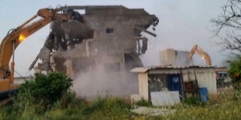
The Israeli army, Tuesday, delivered a notification to demolish two agricultural structures and to stop the construction work on a house in Beit Ummar, a town located to the north of Hebron, according to local sources.
Yousef Abu Maria, an anti-settlement activist in the town, told WAFA that an Israeli army force broke into Beit Zana and Feredes areas, just outside the town, and notified local Palestinians about a military order to demolish two private-owned animal barns.
The army also handed Saber Abu Maria, a local Palestinian, a military order to stop the construction work on his house, under the pretext of construction without a permit. The force also seized a tractor in the area, according to WAFA.
Also on Tuesday, Israeli forces confiscated construction materials and equipment belonging to the municipality of Dahiriya, to the southwest of Hebron, according to local sources.
An Israeli army force broke into Wadi al-Khalil neighborhood outside the town, where they obstructed a municipal project to open an agricultural road; run by Dahiriya municipality in cooperation with Action Against Hunger (ACF).
The army seized some of the construction materials and equipment used in the project, as well as handed over a notice to stop the project immediately, under the pretext of lacking an Israeli-issued work permit in the area.
The project area is located in Area C of the West Bank, which is under full Israeli military and civil control.
Israel rarely issues construction permits for Palestinians in Area C and in East Jerusalem, forcing Palestinians to construct without obtaining an Israeli permit.
Issuing permits for Palestinians, unlike for Jewish settlers, requires unreasonable fees that most families cannot afford to pay.
The Israeli Committee against House Demolitions (ICAHD) explains in a special report that “in almost all cases Palestinians have no choice but to build ‘illegally’, as permits are almost impossible to obtain.”
“Many Palestinians have suffered multiple displacements, having lost their homes and livelihoods more than once. Forced displacement has a series of immediate and longer-term physical, socio-economic and psycho-social impacts on Palestinian families.”
It added, “It deprives them of their home and land – often their main asset – and frequently results in disruption to livelihoods, a reduced standard of living and limited access to basic services. The impact on children can be particularly devastating,” said the United Nations Office for the Coordination of Humanitarian Affairs (OCHA).
Yousef Abu Maria, an anti-settlement activist in the town, told WAFA that an Israeli army force broke into Beit Zana and Feredes areas, just outside the town, and notified local Palestinians about a military order to demolish two private-owned animal barns.
The army also handed Saber Abu Maria, a local Palestinian, a military order to stop the construction work on his house, under the pretext of construction without a permit. The force also seized a tractor in the area, according to WAFA.
Also on Tuesday, Israeli forces confiscated construction materials and equipment belonging to the municipality of Dahiriya, to the southwest of Hebron, according to local sources.
An Israeli army force broke into Wadi al-Khalil neighborhood outside the town, where they obstructed a municipal project to open an agricultural road; run by Dahiriya municipality in cooperation with Action Against Hunger (ACF).
The army seized some of the construction materials and equipment used in the project, as well as handed over a notice to stop the project immediately, under the pretext of lacking an Israeli-issued work permit in the area.
The project area is located in Area C of the West Bank, which is under full Israeli military and civil control.
Israel rarely issues construction permits for Palestinians in Area C and in East Jerusalem, forcing Palestinians to construct without obtaining an Israeli permit.
Issuing permits for Palestinians, unlike for Jewish settlers, requires unreasonable fees that most families cannot afford to pay.
The Israeli Committee against House Demolitions (ICAHD) explains in a special report that “in almost all cases Palestinians have no choice but to build ‘illegally’, as permits are almost impossible to obtain.”
“Many Palestinians have suffered multiple displacements, having lost their homes and livelihoods more than once. Forced displacement has a series of immediate and longer-term physical, socio-economic and psycho-social impacts on Palestinian families.”
It added, “It deprives them of their home and land – often their main asset – and frequently results in disruption to livelihoods, a reduced standard of living and limited access to basic services. The impact on children can be particularly devastating,” said the United Nations Office for the Coordination of Humanitarian Affairs (OCHA).
1 jan 2016
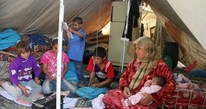
The UNRWA has said it will provide financial support of 1.77 million dollars for the owners of destroyed houses in the Gaza Strip.
The UNRWA stated on Thursday that these funds would be given to 7,443 Palestinian families in different areas of Gaza.
The agency asserted that the aid would be earmarked for emergency housing purposes, which includes home repairs and reconstruction as well as temporary accommodation solutions.
The UNRWA stated on Thursday that these funds would be given to 7,443 Palestinian families in different areas of Gaza.
The agency asserted that the aid would be earmarked for emergency housing purposes, which includes home repairs and reconstruction as well as temporary accommodation solutions.
Page: 2 - 1
